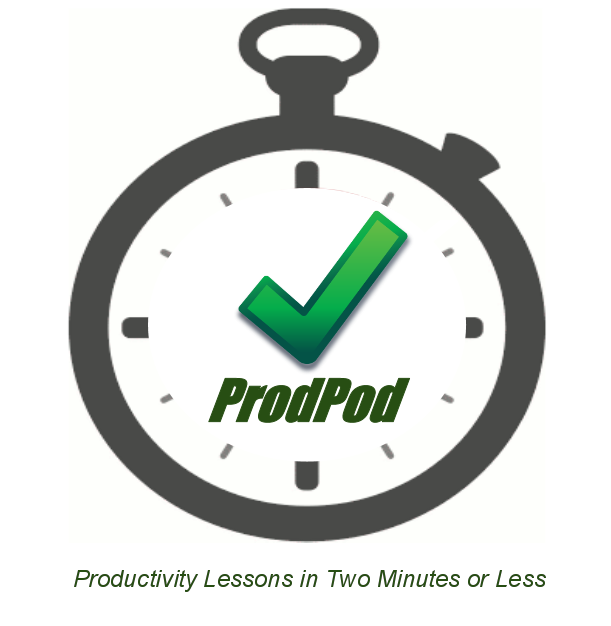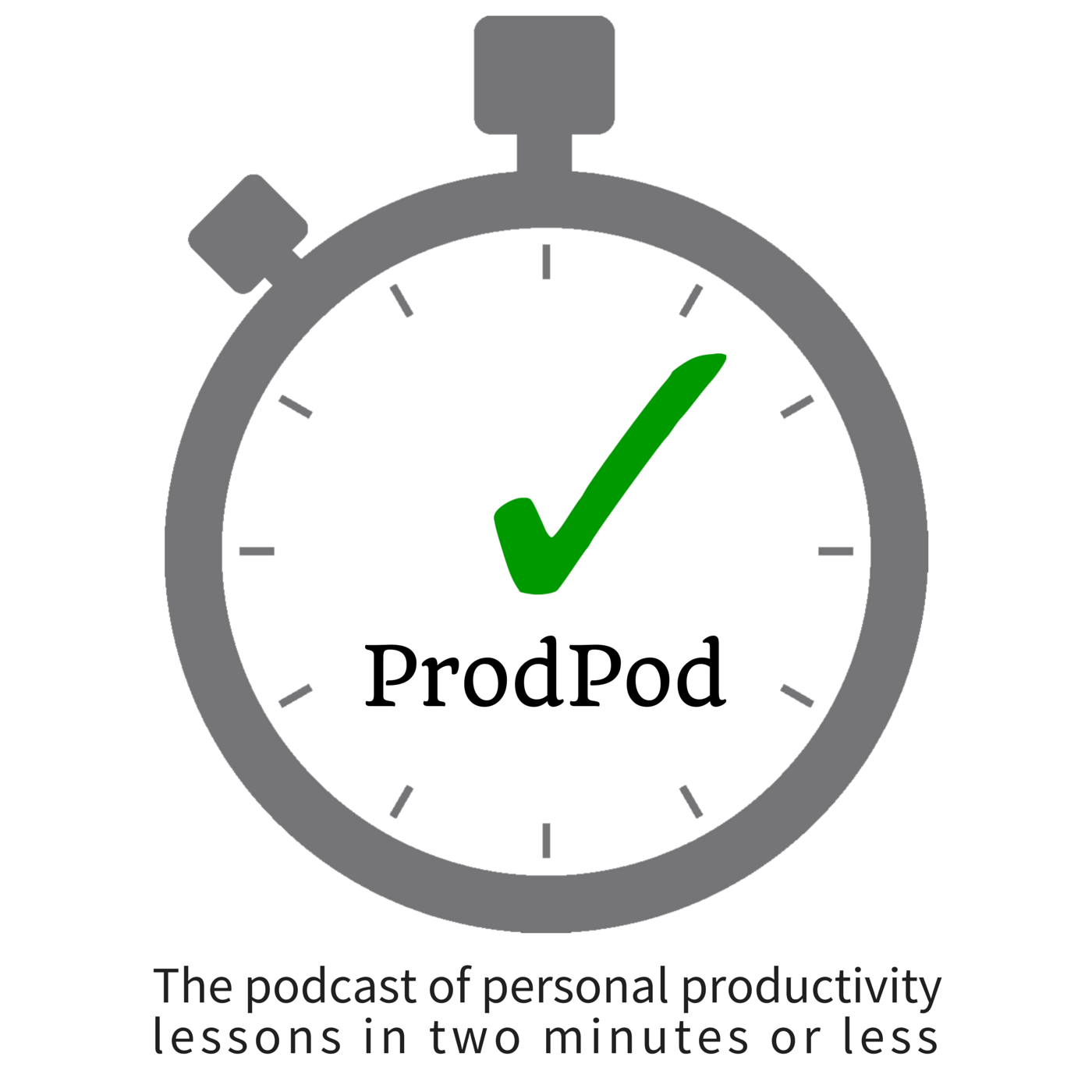Episodes

Tuesday Nov 01, 2011
ProdPod: Episode 23 --
Tuesday Nov 01, 2011
Tuesday Nov 01, 2011
Perseverance is a definite key to success. And, there are opportunities to persevere in everyday life.
"Become a 'possibilitarian.' No matter how dark things seem to be or actually are, raise your sights and see the possibilities-- Always see them, for they are always there." ~Norman Vincent PealeI'd like to invite everyone listening to the podcast to my new live, monthly Twitter conversation, Productivity Chat or prodchat. Please visit productivity.podbean.com to learn more, and see how easy it is to join the conversation!
Perseverance is not the prettiest word. It sounds harsh and dark and sharp. It turns out, though, that to persevere is the one characteristic unique among all successful people. Whether it's in love, a kid's soccer game or corporate America, the fact that you didn't give up is the key for moving beyond the short-term wins and losses and onto the greater goal. I started to think about my own life and how I could think about perseverance vis-a-vis my productivity. I persevere when I don't feel like working anymore for the day and I do that *one more item* on my Next Actions list that doesn't take much energy. I persevere when I decide to dive into a large project by doing just the next thing (e.g., that first phone call, email or the first sentence of a vision/mission statement) and then decide to continue on with the next action on that project. In what ways do you persevere every day?
I encourage you to think about these possibilities to persevere whenever you can, every day. There are opportunities to overcome challenges, competing priorities, and take advantage of openings in your schedule throughout the day to greater productivity.
"Become a 'possibilitarian.' No matter how dark things seem to be or actually are, raise your sights and see the possibilities-- Always see them, for they are always there." ~Norman Vincent Peale
I'd like to invite everyone listening to the podcast to my new live, monthly Twitter conversation, Productivity Chat or prodchat. Please visit productivity.podbean.com to learn more, and see how easy it is to join the conversation!
I HOPE YOU ENJOYED THIS EPISODE OF PRODPOD. THIS IS RAY SIDNEY-SMITH AND THANKS FOR LISTENING! HERE'S TO YOUR PRODUCTIVITY SUCCESS...IN TWO MINUTES OR LESS.

Tuesday Oct 25, 2011
ProdPod: Episode 22 -- Defining procrastination
Tuesday Oct 25, 2011
Tuesday Oct 25, 2011
Sometimes, it's all in how you define an unproductive behavior that starts to build new, productive behaviors. I'd like to invite everyone listening to the podcast to my new live, monthly Twitter conversation, Productivity Chat or prodchat. Please visit productivity.podbean.com to learn more, and see how easy it is to join the conversation!
The first accepted definition is procrastination being a lack of motivation leading to non-action. The second common definition of procrastination is the putting off till tomorrow what you can do today. The third, lesser known and my personally-accepted definition, is the doing of lesser-priority activities instead of doing higher-priority activities. Therefore, procrastination is a supplanting of activities, delaying activities of higher importance as a by-product; not laziness, not lack of motivation, and not lacking in self-efficacy.
Normally I would say that asking yourself why you're thinking a particular way would be the first step to conquering any unproductive behavior; however, this is an exception to that as I think you shouldn't think one more minute about why you procrastinate and stop defining procrastination as a character trait. Banish the term "procrastinator" and the statement "I'm a procrastinator" from your vernacular. It's a behavior and behaviors can change by building new, productive behaviors.
Heck, procrastination can be positive; for example, doing a high priority activity when the right energy, emotion or competence is not available can be detrimental. Doing the lower-priority activities during those times can be the best use of your time.
I'll have many more episodes on conquering and finding balance with procrastination, and I wanted to set a good definition in place for the context of managing procrastination and, ultimately, your productivity.

Tuesday Oct 18, 2011
ProdPod: Episode 21 -- How to Worry Less
Tuesday Oct 18, 2011
Tuesday Oct 18, 2011
First: If you do worry a lot, there is probably a good reason why you began worrying often between adolescence and young adulthood. I'm not going to be able to help you much in that regard, but to say that some introspection is in order. If you find the source of your worry, you can address it and let it go.
Second: Emotions are easily swappable. So, with worry, all you need to do is use that energy to think about the problem not just about worrying. Specifically, I want you to think about what the worst thing is that could happen for whatever is the focus of your worry. Take yourself to that place momentarily and determine whether it's that big of a deal or not. Once you've gotten yourself adjusted to whether triage is needed or planning; that is, it is a big deal and you need to go into immediate action to stop damage to life and limb, or, it's possible to plan and act to reduce possible issues.
Third: If you've decided you can limit the catastrophe you're worrying about, go ahead and start doing the things that you can to make the outcome better for you. I'm not trying to say that everything is always going to turn out perfectly if you actively mitigate potential problems, but why sit around and worry knowing you could have done *something* to stave or halt problems from occurring? The very act of doing instead of ruminating limits your mind's ability to actually worry.

Tuesday Oct 11, 2011
Tuesday Oct 11, 2011
In this episode, I describe my unfortunate relationship with the definition of the word "savings" for many years and what it taught me about productivity.
When I was in my late teens and was into reading books on financial literacy, I learned along the way a peculiar definition of "savings." Savings, according to this definition, is the deprivation of something now for later benefit. I struggled for many years of swallowing the idea of depriving myself, since savings was a positive tactic in financial strategy books I read. Savings was supposed to help you feel safe and pacify you about the uncertainty of life, not something that was scary and made you think of scarcity in your everyday life. I learned many years later that the true lesson of my unfortunate relationship with the definition of savings was that self-control, discipline and habits are inherently positive and deprivation was not the right choice of words. It wasn't until I read Steven Covey's 8th Habit when he discussed the concept of discipline as freedom, that I broke this negative association with the word savings. What those financial strategy books were trying to explain but never quite expressed was that a productive life means having the self-control to determine your own path--past, present and future. I mean that by understanding and guiding one's experiencing self and remembering self, you build a skill to build a life of fulfillment. It wasn't about a mass of money I'd put out of reach so that I'd miss rich life experiences only to be able to afford to keep up with the cost of living when I'm old and fully gray. It was even more than the adage "a penny saved is a penny earned"...it was that small habits of planned giving and taking make huge positive impacts long-term. This lesson has always been intensely motivating and I use it regularly to remind me that it's not about doing more with less, but doing more begets more and doing less begets less and both are useful tools.
I HOPE YOU ENJOYED THIS EPISODE OF PRODPOD. THIS IS RAY SIDNEY-SMITH AND THANKS FOR LISTENING! HERE'S TO YOUR PRODUCTIVITY SUCCESS...IN TWO MINUTES OR LESS.

Tuesday Oct 04, 2011
ProdPod: Episode 19 -- SMART Goals for Project Planning
Tuesday Oct 04, 2011
Tuesday Oct 04, 2011
One of my favorite finds when it comes to project planning was the acronym SMART. It stands for specific, measurable, achievable, relevant and time-sensitive. Recently I've learned of additions to the acronym to make it SMARTER, to include evaluate and reassess to the SMART goal planning process.
I use the SMART criteria specifically during my planning phase of any project, for writing out my project descriptions thoroughly. For example, before I used SMART criteria for my goals, I would write a goal as: Increase company's third quarter revenue. Now, using the SMART goal format, the revised goal is written as: Empower sales managers to implement our sales/marketing plan to increase company's third quarter revenue by 15% in the southeast region to determine annual bonuses, by dedicating one day of every week to the team.
By its face, it's certainly much longer than the original, but more importantly, the detail with which the goal is defined, it allows me to view my Projects list with no question about the mission, vision and general action plan for how I'm going to complete this project. It answers the questions of why, what and how, so you can get to work, motivated and ready for action. I hope writing SMART goals becomes a useful tool (and regular productive habit) for you in getting more of your important, not-urgent projects accomplished.

